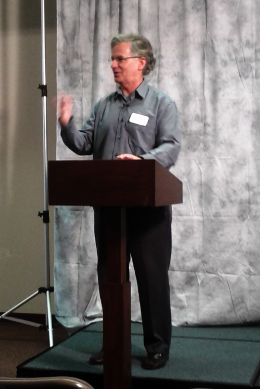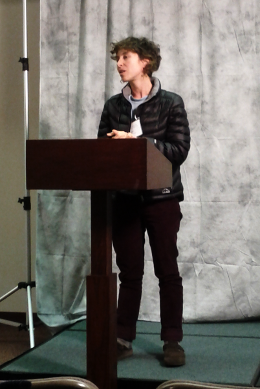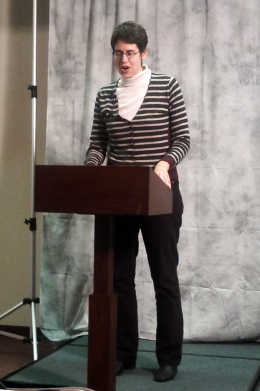Last night was the opening night of the NWTRCC national gathering at the Earlham School of Religion in Richmond, Indiana.
Earlham is a Quaker educational institution, and so there is more than usual interest in the history and current practice of war tax resistance in the Society of Friends at this gathering.
But we have war tax resisters here from a variety of backgrounds, and from all over the country… and even as far away as Kipkarren River, Kenya. They include relatively new resisters, and some legendary veterans of the movement.
The evening began with Lonnie Valentine (the Trueblood Professor of Christian Thought and Professor of Peace & Justice at Earlham), speaking on the topic of “Quakers and the War Tax Concern: Unfinished Business?”
He believes that peace-minded Quakers need to become more “militantly nonviolent” if they want to recapture the way in which their movement was once a real threat to the status quo. Radical societal change can only come about if the powers that be are undermined on multiple levels — economically, militarily, politically, and ideologically. Early Quaker tithe and tax resistance was conducted in that fashion, but now (when such things are practiced at all) they tend to be much less confrontational and much narrower in scope.
He recapped the struggle the Society of Friends had when trying to determine the limits of war tax resistance, and how the eventual compromise (to resist explicit war taxes, but not taxes “in the mixture”) proved unsatisfying and unstable, and was challenged by John Woolman and others.
Valentine told the story of Quaker William Rotch of Rhode Island, who, after receiving some bayonets as part of a payment of a debt due him during the Revolutionary War, threw them overboard rather than risk having them requisitioned by the military. Valentine then challenged the audience to consider whether property destruction of a similar sort might be a worthy addition to their war tax resistance tactics.
What if, he asked, instead of only having a war tax resisters’ penalty fund to reimburse resisters who had penalties and interest seized by the IRS, we also had a more assertive response, in which we destroyed federal government property equal in value to any seizures it made?
Valentine believes that Quakers, not only because of the important role they have played in American war tax resistance, but also because of the ways they have also dropped the ball in that movement, have a special responsibility to lead now. He was a little less certain about how to make this happen… suggesting that maybe a campaign to try to get a lot of Quakers to resist a small, symbolic amount might be a good start.
Valentine’s talk will be the basis for an exhibit being prepared for display at Wilmington College (Ohio) entitled: “What If They Gave a War and Nobody Paid? War Tax Resistance Among American Friends” that is due to open .
After dinner, Joanna Swanger, Director of Earlham College’s Peace and Global Studies Program, gave the opening convocation on the subject of Strategizing for Social Change in 21th Century America.
Swanger’s talk concentrated on the theory of peace action. She believes that the principles of non-violent action as studied by Gene Sharp and others are not necessarily applicable to our place and time. This is in part because she believes that the U.S. government does not respond to nonviolent pressure in the way expected by this school of nonviolence theory, and also in part because the internet and corporate control of media have changed the rules of visual communication in society.
What should we do instead? Well, I’m not too sure what she recommends. It all sounded pretty abstract to me and I tuned out after a while.
is the first full day of the conference, full of workshops and then a keynote address by Peter Goldberger on the ramifications of the Supreme Court’s Hobby Lobby decision for American war tax resisters.



